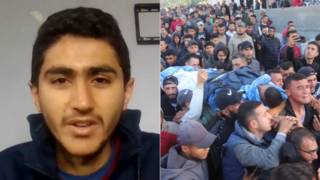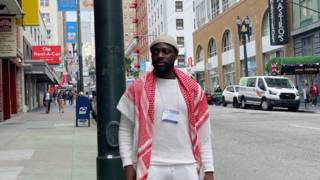
Guests
- David JonesMTA board member, president and CEO of the Community Service Society of New York.
- Keanu Arpels-Josiahclimate activist and organizer with Fridays for Future NYC.
Democratic New York Governor Kathy Hochul has shocked constituents this month with a surprise decision to cancel New York City’s congestion program plan just weeks before it was set to start. Hochul had previously supported the plan, which would have charged drivers $15 to enter parts of Manhattan in order to fund the city’s public transportation budget. New York City’s public transportation system, the Metropolitan Transportation Authority (MTA), is used daily by millions of city residents but has long been plagued by underfunding for necessary expansions and repairs. Congestion pricing has been championed by a wide coalition that includes disability rights advocates, low-income residents and climate activists. The program was expected to dramatically reduce air pollution and fossil fuel emissions in the third-highest emitting city in the world. We hear from two New Yorkers: David Jones, an MTA board member and the president and CEO of the Community Service Society of New York, and Keanu Arpels-Josiah, a young climate activist with Fridays for Future NYC who has just graduated high school. “We’re at a dire point in the climate crisis,” and Governor Hochul is “failing on this issue,” says Arpels-Josiah.
Transcript
AMY GOODMAN: This is Democracy Now!, democracynow.org. I’m Amy Goodman, with Juan González.
This week, as much of New York City is under an air quality alert, activists are demanding Democratic Governor Kathy Hochul reverse her shocking decision to cancel New York’s congestion pricing plan weeks before it was set to start. Hochul abruptly halted the plan she had long advocated for, which would have charged cars and trucks a fee between $15 and $36 to enter Manhattan. The governor defended her decision Sunday on MSNBC.
GOV. KATHY HOCHUL: What are we doing to our residents, our citizens? We’re hearing their cries for relief. Putting on an additional cost of $15 at this moment, when people are going to the grocery stores, and they’re shocked at how much less they can buy with the same amount of money week after week. They just received word in New York City, their water rates are going up. The rent stabilization board just went up. So, how much can we do in state government to relieve the burden and the pain that our citizens are feeling? We cannot be tone deaf to them at this time. But my commitment to public transportation is second to none.
AMY GOODMAN: But the governor has refused to provide details about exactly how she plans to fund the Metropolitan Transportation Authority, or MTA, now that it faces a $15 billion shortfall in its budget that would have been raised by congestion pricing and used to improve accessibility and fund expansions of the city’s mass transportation system, relied on by low-income residents to work, take their kids to school and so much more. This week, members of the MTA board are meeting to address service reliability and station accessibility without those funds.
Meanwhile, climate advocate Bill McKibben described the governor’s abandonment of the program, which would also reduce air pollution and fossil fuel emissions, as one of the most aggressive anti-environmental actions ever undertaken by a Democratic governor. The outrage over Hochul’s decision spans generations.
For more, we’re joined by two guests. David Jones is with us. He is an MTA board member, also president and CEO of the Community Service Society of New York, which focuses on the economic advancement and civic participation of low-income New Yorkers. And we’re joined by Keanu Arpels-Josiah, a climate activist and organizer with Fridays for Future NYC.
We welcome you both to Democracy Now! David, let’s begin with you. Thank you so much for taking time from this three-day meeting of the MTA board. Can you respond to the governor? She has said that, you know, this just hurts too many people. But what people is she talking about? Who does congestion pricing help? David, we don’t hear you. Go ahead.
DAVID JONES: This may not work.
AMY GOODMAN: Yeah, it’s working. We can hear you, David. David, we don’t hear you. We’ll come back to you. Let’s go to our next guest, Keanu Arpels-Josiah. When you heard the governor speak and cancel this program, that she had long advocated for, as the governor before her and beyond, what was your response?
KEANU ARPELS-JOSIAH: It was outrage. I mean, this is a program that Governor Hochul, as you mentioned, has spent the past five years advocating for. And all of a sudden, just weeks away from its implementation, just weeks away of the traffic, of the cameras, the toll cameras, coming on in Lower Manhattan, she completely reversed it.
And that completely fits with the governor’s general policy on climate. She has been failing our generation on climate across the board. In her State of the State address back in January, she only spent one sentence of the hourlong address talking about the climate crisis. And that fits with the amount of action her administration has been doing on climate.
AMY GOODMAN: You know, we’re talking on Primary Day. This is a primary —
KEANU ARPELS-JOSIAH: That’s right.
AMY GOODMAN: — in Colorado, but also here in New York. Very significant she canceled this just before this primary. But if you can talk about the climate effects? You know, today we wanted to have two generations on, from David Jones, you know, an icon here in New York, to you, Keanu. You just graduated from high school. You’re wearing a pin that says “Climate Can’t Wait.” You’re, for your age, going to be 19 tomorrow, a longtime climate activist, which is amazing. What does congestion pricing have to do with the climate?
KEANU ARPELS-JOSIAH: Yeah. So, the climate crisis, as we know, is here and now, as you mentioned. The air quality in New York City is getting worse and worse. And we know that we’re at a dire point in the climate crisis. The U.N. head of climate recently said we have two years left to save the world, and that is not exaggeration.
In New York City, we’re the third-biggest emitting city in the world, and 25% of our emissions come from vehicles. So, that’s what congestion pricing aimed to tackle. It aimed to begin to cut down those emissions. It aimed to begin to actually meet our climate goals. We know we have to reduce emissions by 50% by 2030 here in New York state, and we’re far, far below that. So, congestion pricing aimed to begin to do that.
And with Governor Hochul’s cancellation of this program and her failure on climate across the board, she continues to refuse to sign critical climate legislation to make fossil fuel companies pay their fair share, like the Climate Superfund Act, and she’s failing our generation across the board. And it really brings us to a moment where one of the biggest blue states in America, New York state, one of the biggest economies in America, is failing on this issue of climate. And my generation is horrified.
AMY GOODMAN: Well, we have David Jones on the phone with us right now. David Jones, if you can talk about what this means for the MTA? You’re an MTA board member, also president and CEO of Community Service Society. You’re talking about billions the MTA is losing. Who would have gained from congestion pricing, David?
DAVID JONES: Well, [inaudible] congestion pricing was passed in 2019 by the Legislature, signed by the governor at the time, Andy Cuomo. And up until about a week and a half ago, it was about to be implemented at the end of this month. It was going to mean a tremendous boost to the capital needs of the MTA, in not only subways and buses, but the Long Island Rail Road and Metro-North. And basically, it was only going to capital. So, this was going to be state of good repair, as I’ve said repeatedly, so the wheels don’t fall off, but also the 2nd Avenue subway, something that had been promised to the people of Harlem decades ago. It also was going to mean making accessible, pursuant to numerous lawsuits, ADA accessibility for the handicapped. And all of that now has been put into question.
But it also, obviously, as your speaker before me mentioned, not going to deal with congestion that’s in the central business district in New York, which leads to trucks, buses and cars idling for literally hours and spewing out fumes that impact air quality.
JUAN GONZÁLEZ: Both David and Keanu, I have to confess to you, I have long been a skeptic on the congestion pricing in the decades that it’s been proposed in New York City for two reasons I’d like you to respond to. One, Keanu, on the pollution issue, why not just do what Mexico City has done for decades, which is limit cars coming into the metropolitan — into the city by license plate numbers? And Mexico City sharply reduced its pollution as a result of that kind of policy. And, David, to you, I respect you immensely, but the MTA is notorious for wasteful spending of billions of dollars on capital projects. How are we to expect that the new revenue from a regressive tax, largely on working-class and middle-class people, is going to make the MTA more efficient in its use of public dollars?
KEANU ARPELS-JOSIAH: Yeah. So, I’d like to respond to that first, if I can, just on your presumption that the tax is mostly a regressive tax on lower- and moderate-income New Yorkers. It’s, first of all, not a tax. It’s a toll, right? And second of all, that is not beared out in the statistics. Fifty-five percent of workers traveling into the central business district zone, which is what the congestion pricing plan affects, are higher-income. Eighty-three percent are higher- and moderate-income. So, that means also if you look at the statistics for how low-income New Yorkers are traveling into Lower Manhattan, for every one New Yorker who might be traveling via car into the central business district, there are 50 who are waiting for a delayed subway, waiting for a delayed bus. Every New Yorker has a story of waiting for a bus or subway for extreme amounts of time.
And the solution to affordability in New York, as the governor has herself been saying for 50 years, is not canceling congestion pricing. It’s funding the MTA. It’s giving us reliability. It’s giving us accessible subway stations. That’s really what congestion pricing is about. It’s about what future we want for New Yorkers. Is it one where we have reliable subway? Is it one where we have air that we can breathe without getting asthma? Is it one of climate and environmental justice? Or is it one where we have to wait on hours in gridlock traffic?
AMY GOODMAN: Keanu Arpels-Josiah, we want to thank you for being with us — that does it for this show — climate activist and organizer with Fridays for Future NYC. And we want to thank David Jones — sorry for the connection problems — MTA board member and president of Community Service Society of New York.
That does it for our show. Democracy Now! is currently accepting applications for a director of development. Learn more at democracynow.org. I’m Amy Goodman, with Juan González. Thanks so much for joining us.












Media Options